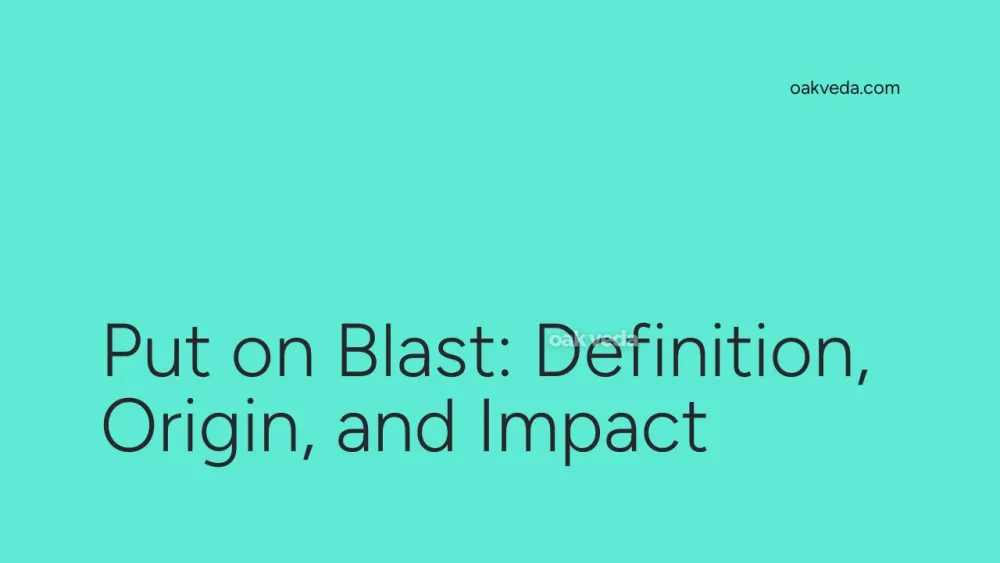
What is Put on Blast?
"Put on blast" is a popular social media term that refers to the act of publicly exposing or criticizing someone's actions, behavior, or personal information. This practice typically involves sharing negative or embarrassing details about an individual to a wide audience, often through social media platforms or other public channels. The intention behind putting someone on blast is usually to call them out, hold them accountable, or express disapproval of their actions.
Origin and Development of Put on Blast
The phrase "put on blast" originated in hip-hop culture during the 1980s and 1990s. Initially, it referred to playing music loudly, with "blast" signifying the high volume. Over time, the term evolved to mean publicly calling someone out or exposing their misdeeds. As social media platforms gained popularity in the 2000s and 2010s, the phrase found a new home in the digital realm, where it became synonymous with public shaming and online call-out culture.
How Put on Blast Works
Putting someone on blast typically involves the following steps:
- Gathering evidence: This may include screenshots of conversations, photos, videos, or other digital artifacts that support the accuser's claims.
- Creating a public post: The accuser shares the evidence along with their commentary on social media platforms like Twitter, Facebook, or Instagram.
- Tagging and sharing: To increase visibility, the accuser may tag the person being called out or use relevant hashtags.
- Encouraging engagement: The post often invites others to share, comment, or take action against the person being put on blast.
Popular Examples of Put on Blast
Several high-profile cases of putting someone on blast have occurred in recent years:
- Celebrity call-outs: Influencers and celebrities have been put on blast for problematic behavior, cultural appropriation, or insensitive comments.
- Political figures: Politicians have faced public scrutiny when their past actions or statements are exposed on social media.
- Brand controversies: Companies have been put on blast for poor customer service, unethical practices, or offensive marketing campaigns.
Impact of Put on Blast on Social Media Culture
The practice of putting someone on blast has significantly influenced social media culture:
- Accountability: It has created a form of public accountability, where individuals and organizations face immediate consequences for their actions.
- Cancel culture: Put on blast is closely tied to cancel culture, where public figures may lose support or opportunities due to exposed misconduct.
- Cyberbullying concerns: The line between justified call-outs and cyberbullying can be thin, raising ethical questions about the practice.
- Viral content: Posts putting someone on blast often go viral, shaping online discourse and trending topics.
Controversies Surrounding Put on Blast
The act of putting someone on blast is not without controversy:
- Disproportionate consequences: The public nature of the call-out can lead to severe repercussions that may not always fit the offense.
- Lack of context: Partial information or misrepresentation can lead to unfair judgments and mob mentality.
- Privacy concerns: Sharing personal information or private conversations raises ethical and legal questions.
- Mental health impact: Those put on blast may face significant emotional distress and online harassment.
How Brands and Influencers Navigate Put on Blast
Brands and influencers must be cautious in the age of "put on blast" culture:
- Proactive reputation management: Maintaining transparency and addressing issues quickly can prevent being put on blast.
- Crisis communication plans: Having strategies in place to respond to public call-outs is crucial for damage control.
- Authenticity: Genuine interactions and consistent values can build goodwill and reduce the risk of being put on blast.
- Learning from others: Observing how other brands handle being put on blast can provide valuable insights.
Future Trends Related to Put on Blast
As social media continues to evolve, so does the concept of putting someone on blast:
- Platform policies: Social media platforms are implementing stricter policies to combat harassment and cyberbullying.
- Digital literacy: Increased awareness about the consequences of online actions may lead to more responsible behavior.
- Reputation management tools: New technologies are emerging to help individuals and brands monitor and protect their online reputations.
- Legal implications: As more cases go to court, clearer legal boundaries around online call-outs may be established.
FAQs about Put on Blast
Q: Is putting someone on blast always negative? A: While it's often used negatively, some argue that it can be a tool for social justice and accountability when used responsibly.
Q: Can putting someone on blast be considered cyberbullying? A: Yes, if the intent is to harass or cause harm rather than to address a legitimate concern, it can cross into cyberbullying territory.
Q: How can someone protect themselves from being put on blast? A: Being mindful of one's actions, both online and offline, and addressing conflicts privately when possible can help reduce the risk.
Q: Are there legal consequences for putting someone on blast? A: Depending on the content shared and local laws, there could be legal repercussions, especially if it involves defamation or sharing private information without consent.
In conclusion, "put on blast" has become a powerful and controversial aspect of social media culture. While it can serve as a tool for accountability, it also raises important questions about privacy, ethics, and the nature of public discourse in the digital age. As social media continues to shape our interactions, understanding the implications of such practices becomes increasingly important for navigating the complex landscape of online communication.
You may be interested in:
- IFYKYK: Definition, Origin, and Impact on Social Media
- Content Marketing: Definition, Origin, and Impact
- Sheesh: Definition, Origin, and Impact on Social Media
- Doomscrolling: Definition, Origin, and Impact
- Cottagecore: Definition, Origin, and Impact on Social Media
- Brand Advocate: Definition, Origin, and Impact on Social Media

